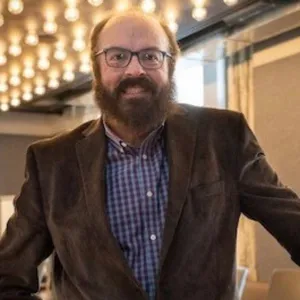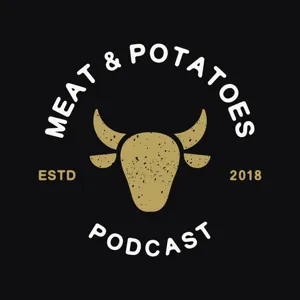Podcast Summary
Violence interrupters like Fats Strong can reduce gang violence: Violence interrupters, former gang members and drug dealers, can prevent violence before it escalates by being present and intervening in potential conflicts.
Policing alone cannot prevent all gun violence in the country, and violence interrupters, like former gang member and drug dealer Sorenzo "Fats" Strong, may provide an effective solution for reducing gang violence. Fats, who used to gang bang and sell drugs on the same streets he now works as a violence interrupter or outreach worker, is an example of how this approach can make a difference. He works in areas with high gang activity, such as the site of the torn-down Rockwell towers near Park 574, where gang activity still occurs. By being present and intervening in potential conflicts, violence interrupters can help prevent violence before it escalates. This approach requires a complex system, but with simplicity in business operations, companies like Mercury can power financial workflows, allowing ambitious companies to perform at their best and focus on their missions.
Preventing Violence: The Role of Interrupters: Interrupters like Fats prevent escalating conflicts by calming down parties and promoting de-escalation, ultimately preventing potential disasters.
Violence interrupters, like Fats and his coworkers, play a crucial role in preventing escalating conflicts between different groups. In the discussed incident at the park, tensions between two gangs led to a shooting and retaliation, resulting in injuries and property damage. However, Fats and his team intervened, calming down both parties and preventing further escalation. They did this by speaking to the perpetrators and the victims, expressing the importance of de-escalation and avoiding further violence. Ultimately, their intervention prevented a potential disaster and allowed both sides to move past the conflict. This example highlights the importance of having individuals and organizations dedicated to interrupting violence and promoting peace.
Former gang member averts potential gun war: Former gang members and formerly incarcerated individuals can prevent violence by intervening in personal disputes, averting potential larger conflicts and addressing root causes of violence
Community intervention plays a crucial role in preventing cycles of retaliatory violence. In the discussed situation, a former gang member named Fats intervened in a conflict between two gangs over a smashed truck window. Instead of resorting to violence, Fats convinced the offending gang to pay for the repairs, thus averting a potential summer-long gun war. This approach, known as violence interruption, is effective because the parties involved prefer to resolve conflicts without police intervention or arrests. Fats, who is paid for his work in preventing gang conflicts, is just one of many former gang members and formerly incarcerated individuals using their experience and community connections to prevent violence on a personal level. This work, though less dramatic than depicted in TV shows, can be highly effective in addressing the root causes of violence, which often stem from petty personal disputes rather than drug turf or gang allegiances.
Neighborhood ownership and protecting territory in high-crime communities: Programs like Ceasefire and community-based violence prevention have reduced homicides by up to 60% in urban areas, but underfunding and challenges remain to significantly impact high murder rates in cities
For many individuals in high-crime communities, maintaining control over their neighborhoods goes beyond financial gain. As Cessie Manion, a violence interrupter and former gang member, explained, holding onto territory is about protecting it from rivals. This concept of neighborhood ownership has been a part of Chicago's gang culture for decades, with smaller groups of friends committing violence over petty disputes. Violence prevention, which gained prominence in the 1990s, has become increasingly important as cities grapple with rising crime rates. Programs like Ceasefire and community-based violence prevention have shown to reduce homicides by up to 60% in urban areas. However, these programs have often been underfunded, but with recent investments from the federal government and local municipalities, there is now significant financial backing behind this approach. Despite this progress, it remains to be seen whether these programs can make a significant dent in the high murder rates of cities like Minneapolis, New York, and others.
Community outreach programs may not significantly reduce overall gun violence: Studies show individual success in reducing gun violence through community outreach, but more research is needed to determine broader impact
While there are individual success stories of organizations reducing gun violence through community outreach, it's unclear if these efforts are having a significant impact on overall violence reduction. Some studies, like one from Northwestern University, suggest that these programs can reduce the likelihood of gun violence victimization and arrests for gun violence for the individuals involved. However, Chicago, where significant resources have been invested in such programs, still experiences high shooting numbers. Therefore, while these efforts are important, more research is needed to determine their broader impact on reducing overall violence.
Challenges of funding and employment for Violence Interrupters in Chicago: Violence Interrupters in Chicago face undercompensation and job insecurity due to grant-dependent contracts, highlighting the complexities of funding and employment for community intervention efforts to reduce violence.
The Violence Interruption work in Chicago, which aims to reduce violence through community intervention, is primarily funded by nonprofit groups and government funding, but the workers, who play a crucial role in resolving conflicts, are not on the police payroll. They are paid significantly less than the median income in the impoverished neighborhoods they work in and often face job insecurity due to short-term contracts dependent on grant funding. Despite the danger and stress of their job, they feel undercompensated. This complex web of funding and employment highlights the unique challenges of addressing violence through community intervention and the importance of adequate resources and support for those on the frontlines.
Violence interrupters' precarious employment: The instability of violence interrupters' jobs can lead them back to criminal activities, affecting program effectiveness and community safety
The dynamic between violence interrupters, law enforcement, and gangs in Chicago's West Side community is complex and tense. Humpty, a violence interrupter with valuable gang connections, illustrates the precarious nature of their employment. While these workers are essential in reducing violence, they are often paid poorly and their jobs are not secure. This instability can lead them to consider returning to their former criminal activities if they lose their jobs. The police, who appreciate their work, have historically been skeptical due to the workers' criminal backgrounds and the potential for relapse. This tension can impact the overall effectiveness of the violence interruption programs and the safety of the community.
Gun violence intervention organizations' impact on communities: These organizations prevent violence, provide opportunities for former gang members and ex-prisoners, and serve as a jobs program, making them a worthwhile investment despite skepticism and the need for data-driven evidence.
The work of gun violence intervention organizations, while facing skepticism and the need for data-driven evidence, plays a crucial role in preventing violence and providing opportunities for former gang members and ex-prisoners. These workers have the potential to make a significant impact on their communities, as illustrated by the story of Ceci, who was able to resist the urge for retaliation after her own family was targeted by gun violence due to her involvement in the program. The importance of this work extends beyond anecdotal evidence, as it also serves as a jobs program for individuals who may have difficulty finding legitimate employment otherwise. Ultimately, it is essential to be skeptical about how we allocate resources, but the potential benefits of this work make it a worthwhile investment.
Economic Instability Affects More Than the Wealthy: The economic downturn caused by rising interest rates impacts individuals and communities beyond the wealthy, as discussed in a podcast episode by Patrick Smith from WBEZ Chicago. Fundrise, a real estate investing platform, is taking advantage of the market downturn to expand its portfolio, allowing individuals to invest with a minimum of $10.
The economic instability caused by rising interest rates is affecting not just the wealthy or those in the spotlight, but also individuals and communities often overlooked by society. This was highlighted in a podcast episode by Patrick Smith from WBEZ Chicago. Meanwhile, in the world of real estate investing, Fundrise is taking advantage of the market downturn by planning to expand its portfolio. For listeners interested in investing, Fundrise offers an opportunity to add the Fundrise flagship fund to their portfolio with a minimum investment of $10. However, it's crucial to carefully consider the investment objectives, risks, charges, and expenses before investing. This information can be found in the fund's prospectus at fundrise.com/flagship. This is a paid advertisement.






